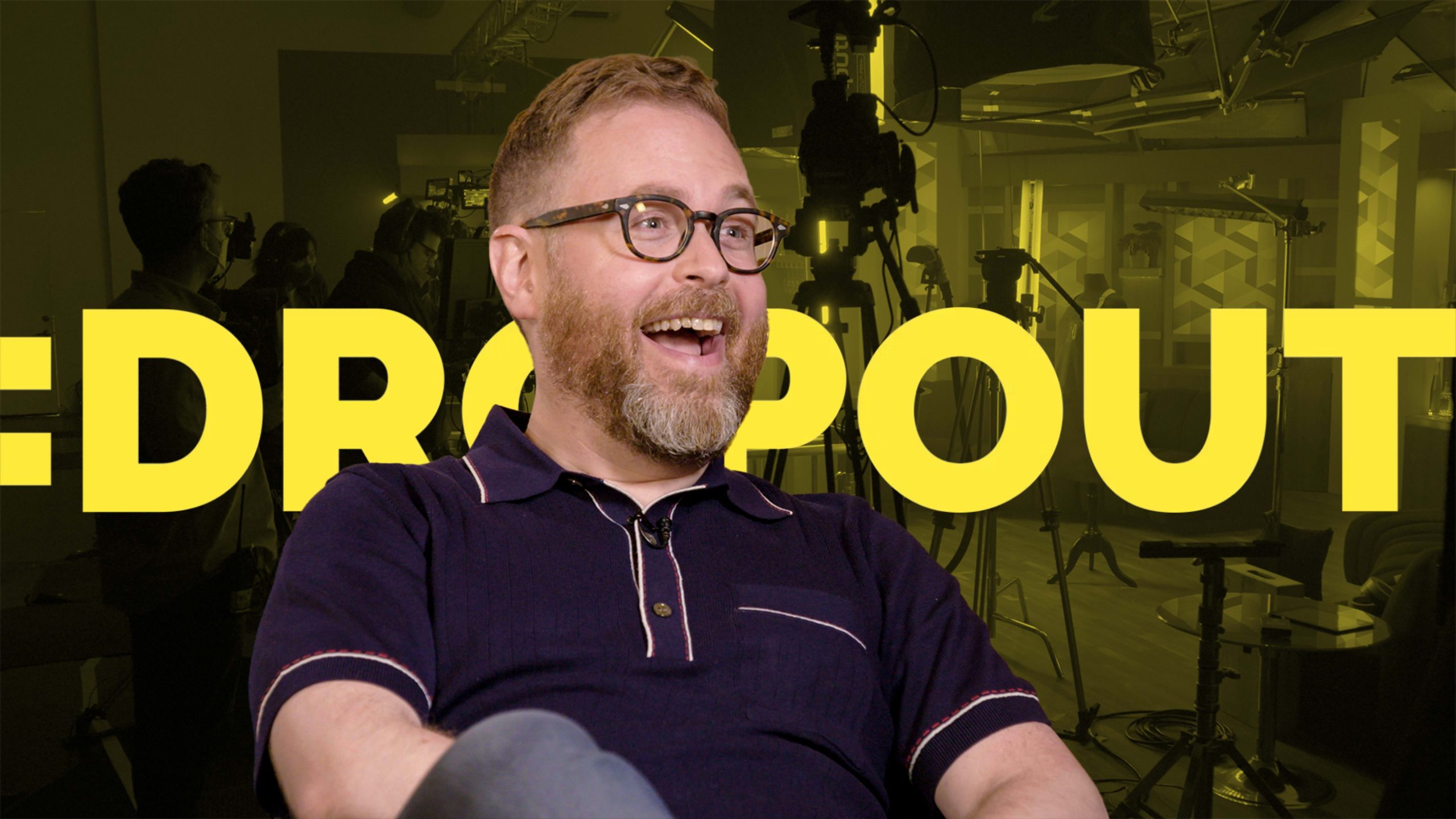This comedy streamer came back from the brink stronger—and funnier—than ever
This comedy streamer came back from the brink stronger—and funnier—than ever
CollegeHumor grew up, rebranded, and started making money.
Improv’s golden rule is never say no. Performers, generally, have to roll with whatever premise their scene partners have introduced. But Sam Reich knows that what works for improv doesn’t always work for business. In his nearly 20 years at Dropout (formerly CollegeHumor), he saw at least nine different leaders try to chase the revenue stream du jour.
That approach led CollegeHumor owner IAC—which paid $26 million for it in 2006—to sell the company to Reich in 2020 for no money and only a minority stake in the business after more than a dozen potential suitors dropped out.
As CEO, Reich has tried to keep the yes and-ing to a minimum, instead building out CollegeHumor’s streaming platform Dropout TV. Growth in the past year has been so strong that the company rebranded in September as simply Dropout.
”We promised ourselves we would only do away with the name when we felt that Dropout was popular enough to eclipse it,” says Reich, who as a high school dropout himself never connected much with the CollegeHumor name. “We feel that time is now.”
In part out of necessity, Reich has focused on populating Dropout with low-cost, long-form improv content, and driving brand awareness through short-form video on social sites like TikTok. The platform now has 11 active series including Game Changer, an improv game show where contestants have to discern what the rules of the game are every episode, and Dimension 20, in which comedians play a live game of Dungeons and Dragons.
By the end of this year, it’s set to have 15 series, including a live comedy special series that will launch this summer with a stand-up special from YouTuber Hank Green. The company has also ventured into live event programming for Dimension 20 in partnership with LiveNation, starting with a four-show tour of the UK this spring and a planned show at Madison Square Garden in January of 2025.
Dropout’s growth has largely fueled by a huge uptick in viewership in in 2023, when the platform doubled its number of subscribers, which Reich said sits in the “mid to high six figures.” While this is a fraction of the audience that the big streamers like Netflix and Hulu get—and even small by the standard of a niche streamer like Crunchyroll, which boasts over 13 million subscribers—Reich is happy to have developed a highly engaged niche audience.
“We’re not in the meta-sport of growing this business,” he says, an approach that means “we can be very slow and responsible and reasonable about it.” Reich’s conservative attitude is designed to set the business up for longevity in a business where platforms like Quibi or CNN+ burn brightly, but never get off the launchpad. “We don’t guess that we’re going to be very successful and then spend against that guessing,” Reich says.
A SERIES OF “GET RICH QUICK” SCHEMES
Reich joined CollegeHumor in 2006 as its director of original content. Over the next 14 years, Reich adapted to shifting content strategies—from YouTube to branded content—to varying degrees of success. “There was always a get rich scheme of the time,” he says, recounting how a focus on ad sales gave way to a television-centric strategy that included a CollegeHumor MTV show and TruTV’s Adam Ruins Everything, and even a dating show on Pop TV. “We had shows on full screen and Comcast Watchable and Facebook Watch and YouTube—all of them short-lived.”
As streaming began to eclipse cable, CollegeHumor launched Dropout TV in 2018. A year after launching, despite projections that the subscription service could turn a profit in time, IAC decided that CollegeHumor was no longer worth the investment and tried to sell the company.
“The problem was we had invested a lot of money in subscription [and the plan put before buyers] had us spending $10 million before we flipped profitable,” Reich says, adding that 15 interested buyers ultimately dropped out of the bidding process. While this was happening, Reich’s fellow executives, including CollegeHumor’ CEO Richard Cusick and CMO Jessica Malloy also left the company.
Ultimately, IAC agreed to Reich’s unconventional, $0 purchase plan. The company was out of the frying pan—but the deal closed just days before the U.S. shut down to curb the spread of COVID-19 in March 2020, thrusting Reich right into the fire.
Going all in on streaming
By the time Reich took over CollegeHumor, the staff had been cut from more than 100 to a skeleton crew of seven. The streamer had about six months worth of content ready to publish. “It was just the bare bones of people to keep the lights on,” says Brennan Lee Mulligan, host of Dimension 20, who was one of the few remaining employees in 2020.
Reich and his small team made the decision to go all-in on a Dropout TV subscription service. They would no longer sell ads and they would close their branded content studio—historically two of CollegeHumor’s biggest revenue generators. It’s counterintuitive, but Reich saw a lack of focus as contributing to CollegeHumor’s slow decline. “I think CollegeHumor suffered from shifting objectives a lot, and so remaining myopically focused on this objective is kind of my thing,” he says. Roughly 85% of the company’s gross revenue now comes from Dropout’s subscription, which cost $5.99 a month or $60 annually.
The subscription-focused strategy paved the way to profitability in 2023, leading Dropout to adopt a profit-sharing model for its employees. (Reich comes by his employee-focused ethos honestly; his father, Robert Reich, was Secretary of Labor under President Bill Clinton.) “I now realize that profit margin isn’t just a matter of making a few people or stockholders wealthy,” he says. At Dropout, profitability “actually protects everything because it means that you can do a little better or a little worse and you have a margin of error. I see it as room to fuck up.”
How big is too big?
Dropout has doubled the size of its audience and content slate over the past 18 months, but COO David Kerns is wary of growing too fast. “We’re very, very hesitant to put ourselves into a risky situation where we feel beholden to investors to reach certain milestones that might not be exactly what we want to do—creatively or philosophically,” he says.
So, Dropout has kept its payroll small, with only 27 full-time staff members and production and talent working on a project-to-project basis. Its focus on formats like game show or live tabletop roleplay games require lower investments than a scripted comedy series, but still favors a familiar rotation of talent.
Mulligan, for example, not only hosts Dimension 20, but can be seen in just about every other series on the platform. Keeping other stalwarts like comedians Lisa Gilroy and Zac Oyama in the Dropout universe, bringing in occasional big names like Wayne Brady and Paul F. Tompkins, helps with retention—which Reich says averages about two years per subscriber. “Once you’re a fan of our talent, you’re not watching them on one show, you’re watching them on several shows,” he says. ‘It’s very hard to be a fan of one of our shows without being a fan of another.”
(11)



